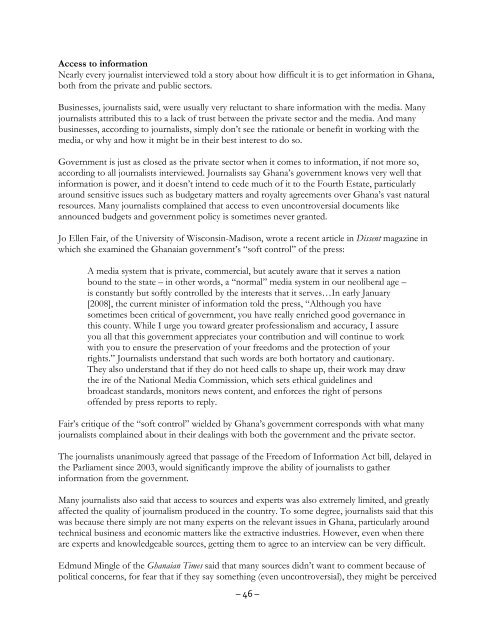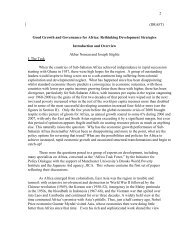THERE WILL BE INK - Initiative for Policy Dialogue
THERE WILL BE INK - Initiative for Policy Dialogue
THERE WILL BE INK - Initiative for Policy Dialogue
You also want an ePaper? Increase the reach of your titles
YUMPU automatically turns print PDFs into web optimized ePapers that Google loves.
Access to in<strong>for</strong>mationNearly every journalist interviewed told a story about how difficult it is to get in<strong>for</strong>mation in Ghana,both from the private and public sectors.Businesses, journalists said, were usually very reluctant to share in<strong>for</strong>mation with the media. Manyjournalists attributed this to a lack of trust between the private sector and the media. And manybusinesses, according to journalists, simply don’t see the rationale or benefit in working with themedia, or why and how it might be in their best interest to do so.Government is just as closed as the private sector when it comes to in<strong>for</strong>mation, if not more so,according to all journalists interviewed. Journalists say Ghana’s government knows very well thatin<strong>for</strong>mation is power, and it doesn’t intend to cede much of it to the Fourth Estate, particularlyaround sensitive issues such as budgetary matters and royalty agreements over Ghana’s vast naturalresources. Many journalists complained that access to even uncontroversial documents likeannounced budgets and government policy is sometimes never granted.Jo Ellen Fair, of the University of Wisconsin-Madison, wrote a recent article in Dissent magazine inwhich she examined the Ghanaian government’s “soft control” of the press:A media system that is private, commercial, but acutely aware that it serves a nationbound to the state – in other words, a “normal” media system in our neoliberal age –is constantly but softly controlled by the interests that it serves…In early January[2008], the current minister of in<strong>for</strong>mation told the press, “Although you havesometimes been critical of government, you have really enriched good governance inthis county. While I urge you toward greater professionalism and accuracy, I assureyou all that this government appreciates your contribution and will continue to workwith you to ensure the preservation of your freedoms and the protection of yourrights.” Journalists understand that such words are both hortatory and cautionary.They also understand that if they do not heed calls to shape up, their work may drawthe ire of the National Media Commission, which sets ethical guidelines andbroadcast standards, monitors news content, and en<strong>for</strong>ces the right of personsoffended by press reports to reply.Fair’s critique of the “soft control” wielded by Ghana’s government corresponds with what manyjournalists complained about in their dealings with both the government and the private sector.The journalists unanimously agreed that passage of the Freedom of In<strong>for</strong>mation Act bill, delayed inthe Parliament since 2003, would significantly improve the ability of journalists to gatherin<strong>for</strong>mation from the government.Many journalists also said that access to sources and experts was also extremely limited, and greatlyaffected the quality of journalism produced in the country. To some degree, journalists said that thiswas because there simply are not many experts on the relevant issues in Ghana, particularly aroundtechnical business and economic matters like the extractive industries. However, even when thereare experts and knowledgeable sources, getting them to agree to an interview can be very difficult.Edmund Mingle of the Ghanaian Times said that many sources didn’t want to comment because ofpolitical concerns, <strong>for</strong> fear that if they say something (even uncontroversial), they might be perceived– 46 –














